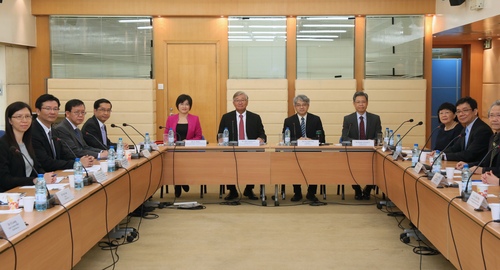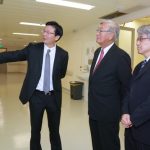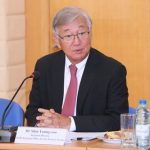 Professionals from the Health Bureau, Kiang Wu Hospital and University Hospital in a meeting with Dr Shin Young-soo.
Professionals from the Health Bureau, Kiang Wu Hospital and University Hospital in a meeting with Dr Shin Young-soo.
The Government was committed to enhancing measures to protect the health of Macao’s citizens, said the Chief Executive, Mr Chui Sai On. Mr Chui’s comments were made on Tuesday (5 April) during a meeting at Government Headquarters with the World Health Organization’s (WHO) Regional Director for the Western Pacific, Dr Shin Young-soo. The Government’s measures for protecting local people included ensuring there were sufficient facilities – geared to WHO standards – to monitor and if necessary control infectious diseases. The Government would act in line with WHO guidelines and would continue to strengthen local facilities for the prevention and control of infectious diseases, said the Chief Executive. These would help minimise the risk of diseases spreading to Macao and around Macao, and enhance the city’s capability to deal with any dangerous new virus that might emerge around the world, he added. Mr Chui also thanked WHO for its support of Macao’s development regarding healthcare and medicine during the 16 years since the establishment of the Macao Special Administrative Region. He cordially welcomed the visit of Dr Shin and other WHO experts, a trip designed to review the latest developments in Macao’s healthcare system. Dr Shin stated that Macao’s planned new unit to monitor and control infectious diseases – and the city’s existing facilities for disease prevention and control – were aligned with WHO standards. He made the remarks after visiting those facilities and meeting with local healthcare professionals. Key in controlling the spread of disease was the application of a sound model for its management, rather than other factors such as the distance between a control centre building and nearby properties, said Dr Shin. WHO had no guideline on the distance issue, Dr Shin added. Dr Shin said it was necessary to plan disease prevention and control facilities to cope with the spread of diseases, even if such measures were expensive. This was because – according to the experience of WHO and of countries around the world –outbreaks of a disease might occur unexpectedly or the disease develop into a new form. He said he was impressed by the Government’s input in healthcare and by Macao’s use of high-standard medical equipment. These facts demonstrated the Government’s vision: to see an expansion of health protection for the public during a time of strong economic performance locally, Dr Shin said. Dr Shin spoke highly of the Government’s efforts in enhancing health services; WHO paid great attention to the city’s medical development, given that Macao was an important member in the Western Asia region, he stated. Macao officials attending Tuesday’s meeting included: the Secretary for Social Affairs and Culture, Mr Tam Chon Weng; the acting Chief-of-Office of the Chief Executive’s Office, Ms Lo Lai Heng; and the Director of the Health Bureau, Mr Lei Chin Ion. WHO’s Director, Division of Health Security and Emergencies for the Western Pacific Region, Dr Li Ailan, was also at the meeting. Additionally on Tuesday, the experts from WHO held a meeting with medical professionals from respectively, the Health Bureau, Kiang Wu Hospital and University Hospital (Macau University of Science and Technology), to exchange views on issues relating to the prevention of infectious disease. During Dr Shin’s visit to Macao he toured a recently-launched infectious disease rehabilitation centre in Coloane. A four-member WHO team had visited the city between 23 and 25 March at the Government’s invitation, to study and analyse Macao’s facilities for the prevention and control of infectious disease. The team concluded that such facilities at Conde S. Januário Hospital – Macao’s main public medical complex – were in line with WHO requirements. The team took a close look at the hospital’s efforts on disease control, including the work of a committee for prevention of communicable diseases; a plan for promotion of community awareness; a system for monitoring global health issues; the supply of personal protective equipment; and the hospital’s management of its medical waste. The WHO’s team also studied the proposed new unit to monitor and control infectious diseases, a building near Conde S. Januário Hospital. The planned building’s disinfection facilities for the filtering of emissions and waste, and the design of its planned isolation wards were found to meet WHO-recommended technical standards.
View gallery





